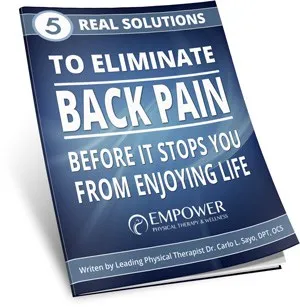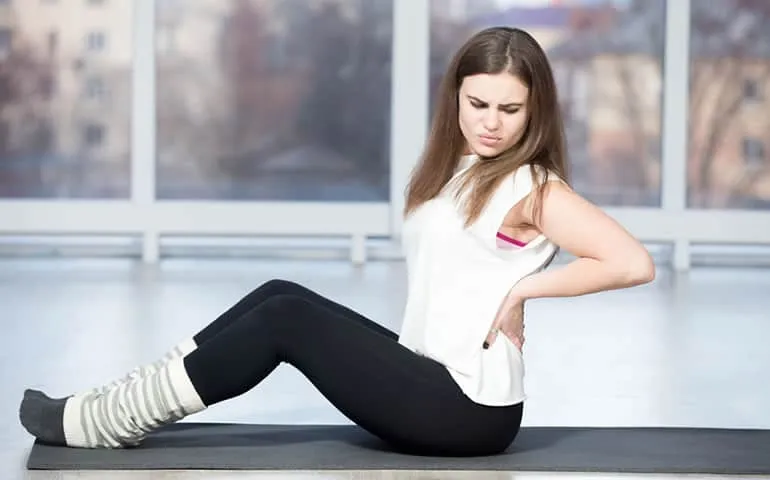Let’s talk about exercise and back pain…
Last week I had a question asked by one of our patients, Jackie, 58, from Chino Hills…
And it’s one that we get asked often (especially during the January gym rush!):
“Is it ok to exercise when my back is hurting? I’ve just got into a good routine sticking to the gym and working out three times a week, and I really don’t want to stop…”
I get the frustration, and I also know that the thought of doing any movement at all when you’re going through some kind of pain might feel a little scary…
You don’t want to run the risk of aggravating it any more in case it turns into something more serious.
You don’t want to go ‘too hard’ in the gym in case you pull another muscle.
And you don’t want to wake up one day to find that you can no longer roll out of bed easily, walk down the road, or even drive because what you did, made it worse.
But don’t let that worry you too much – that’s rarely ever the case! An aching lower back doesn’t mean you’ve got to be housebound, with heat and ice packs until it magically disappears.
You CAN keep moving! In fact, not moving at all can make your back pain worse!
Here’s why…
If you suffer from lower back pain that comes and goes, gentle walking with exercises designed to improve lower back strength and movement added in, will make a big difference.
Walking is a completely natural movement that keeps your joints mobile and muscles working – even those in your feet, legs, hips and torso – which play an important role in keeping the muscles in your back that
hold you up right, strong. Stretching combined with walking will improve your backs strength, flexibility and posture, which in turn, can help stop back pain from creeping up on you when you least expect it. What’s more, it can also reduce how painful it feels and how much it gets in the way of day to day life.
So here’s the important question to answer now that you know it 100% is ok to exercise even if you’ve got a bad back…
What exercise can you actually be doing? Because of course, too much exercise, or exercise that’s strenuous could make it worse or keep it hanging around longer.
Introducing Yoga.
Even though there’s false beliefs around Yoga, like ‘you’ve got to be flexible’ etc., etc., etc… you can ditch those false beliefs behind because it’s for anyone!
Let me tell you why – Yoga helps build strength.
Yoga requires you to concentrate on specific muscles in the body when holding poses – many of which improve back strength. When these muscles are stronger your back pain can be greatly reduced and is less
likely to affect you as bad as it once did. As well as strengthening, Yoga relaxes the body and reduces any tension in stress-carrying muscles (a.k.a your back!). For people with lower back pain, stretching is important. Stretching the muscles in your legs actually help to increase range of movement in your hips, taking the stress off your lower back – which in addition increases blood flow, allowing nutrients to flow in, taking care of the muscles in your back.
It’s also one of the best forms of exercise to maintain and improve a healthy posture. Great for your back, stopping back pain in it’s tracks, and add to that it feels great when you can walk around confident and tall.
So there you have it, gentle walks and yoga.
Both of these will help you gain back your strength in your back, so you can return to doing the exercise you love the most.
If you want tips for easing back pain, here’s free special report with the 5 top tips to keep active with less back pain, just click below to get your free copy.
Believe it or not – most people spend too much time in bed.
And even more people make the mistake of thinking that more time in bed = more energy and feeling ready for the day. Now I know getting out of bed can be tough.
The alarm goes off and for a moment and you just want to stay wrapped up in bed, warm and cozy, wishing you didn’t have to move, hitting the snooze button for ‘just 10 more minutes’.
Of course we get up after a while anyway, usually because we have to, but for many of us it’s a chore and sometimes it’s painful – but it’s a little known fact that spending more that 7-8 hours in bed isn’t good for us.
In fact, it’s unhealthy and a lack of knowledge on this topic is why most people lose the battle of the bedroom. It’s a battle that nearly always gets worse this time of year (when Winter is creeping in and the clocks go back). And what should be the best part of the day can often be stressful.
Some days might be different, but doesn’t the day nearly always start off on a bad note? Especially when the last thing you want to do is get out from under the covers, and then spend the little time you have rushing around to get ready…
But here’s why most people struggle on a morning and lose the ‘bedroom battle’…
A lack of vitamin D (sunlight), eating a balanced diet + spending extra time on the sofa every evening, with a lack of exercise…
…Which leads to the big mistake of thinking that the answer to more energy, is spending more time asleep.
That’s rarely the case. Unless there’s an underlying medical condition, you’re a new mom, or suffer from extreme sleep deprivation.
The reality is that more sleep doesn’t = more energy. It actually makes you feel more tired!
And because that’s the opposite of what most people want to feel each
day, and because a lot of us despise getting out of bed in the morning, here’s some natural ways which can help you wake up of a morning – and there’s no coffee in sight
Find the light…
Melatonin is a hormone produced by your brain and regulates your sleep.
When it’s dark your body produces more melatonin making you sleepy.
When it’s light, the production of melatonin drops.
If you struggle to wake up, open your curtains to let the light in.
And if it’s winter when the clocks have gone back, so you wake up before the sun rises, give an illuminating alarm clock a go – you’ll be woken up naturally with light, and won’t be disturbed all of a sudden with a loud alarm noise!
Keep hydrated…
Your body is made up of 60% water, but when you sleep you sweat, breathe and don’t drink for hour – which dehydrates you.
Dehydration reduces alertness, increases those tired feelings and affects mental concentration.
Before you go to bed place a glass of water beside you and down it as soon as you wake up.
I do this each morning, I have done for months, and I really feel the difference.
Start the day with a healthy breakfast…
It’s been proven that people feel more alert after eating breakfast first thing in the morning.
If your breakfast is high in processed sugar, your energy will drop quickly.
But if you have a breakfast packed full of natural carbohydrates, fats and protein – alertness lasts longer throughout the morning.
(A favorite of mine is scrambled eggs on brown toast and a glass of orange juice)…
Listen to music…
Music has the ability to release feel-good chemicals throughout your body. Starting your day with your favorite up-beat tunes can get you moving, and is guaranteed to set your day off on a good note.
Get active…
This one probably sounds obvious but getting up to do something active in the morning gets your blood pumping and releases your feel-good chemicals.
It doesn’t have to be strenuous exercise like a gym class or a run, it can be something simple like going for a gentle walk, or doing some stretches in the comfort of your own home.
To sum it up – when it comes to sleep, less is more.
On average you need 6-7 hours sleep each night, if you’re currently getting 9 or more, granted, any attempt to switch to less will leave you feeling groggy. But only at first.
If you stick at it for about 30 days, it’ll eventually become a habit that leaves you feeling great with MORE energy.
And not only that, but you’ll also have MORE time in your life!…
Rising earlier could help you to exercise more and give you time to plan and enjoy your day ahead, and even get the housework done in peace if you wanted!
If you manage to make this a healthy habit by climbing out of bed just ONE hour earlier each morning you will find spare time equivalent to an entire week in your life. Every month.



